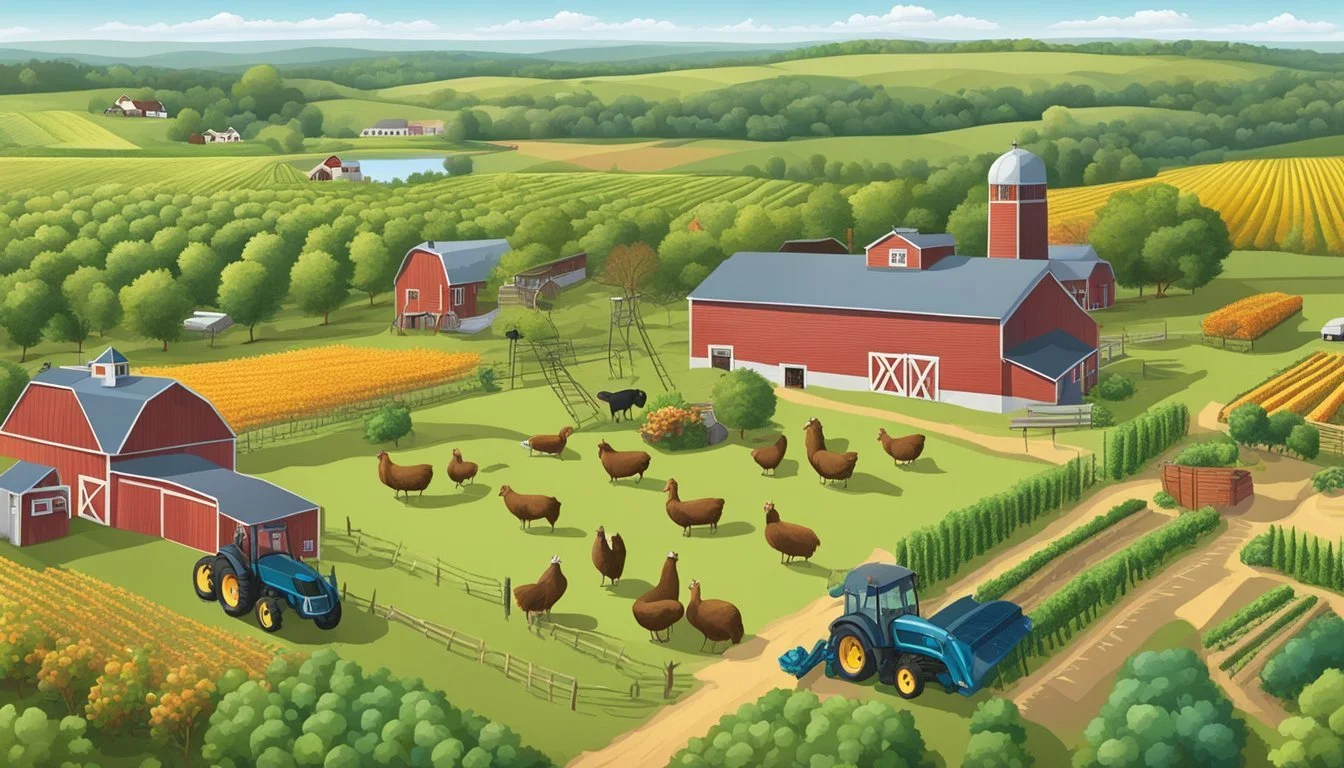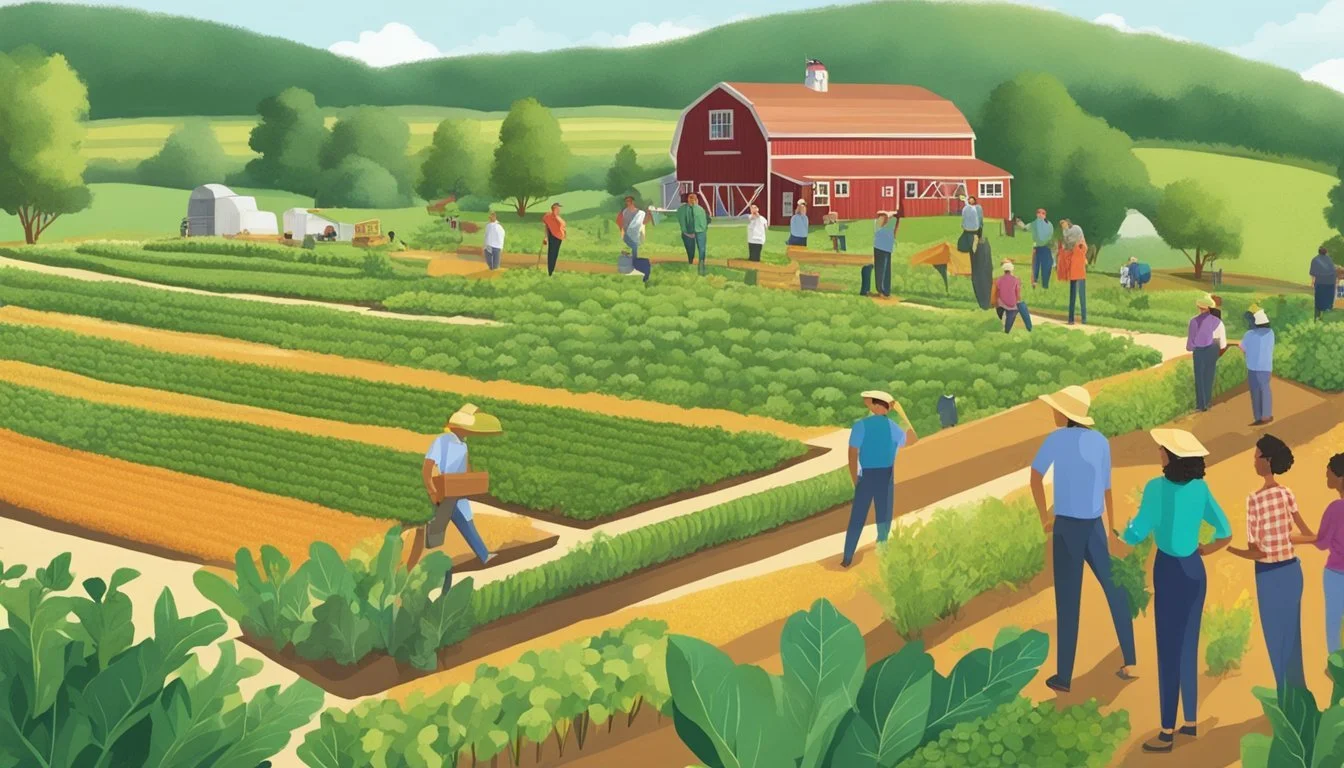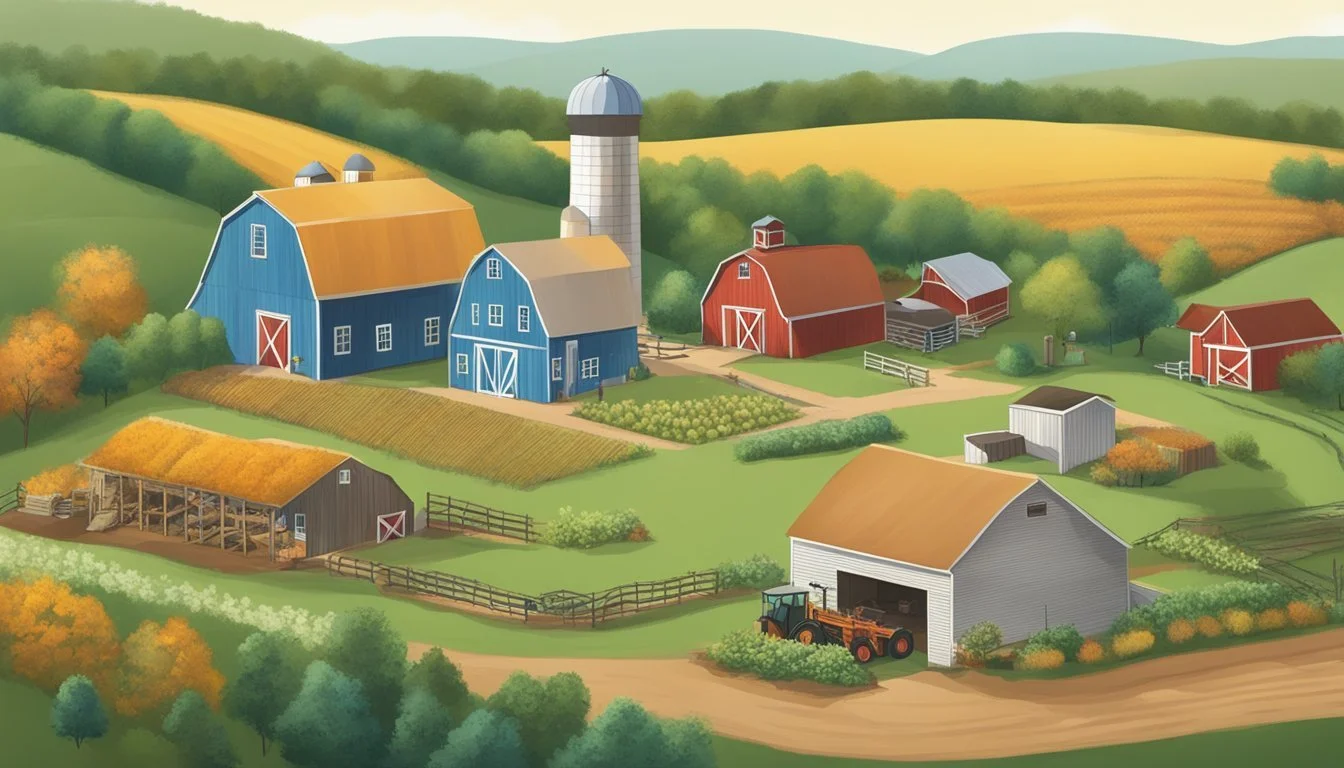Agritourism in New Jersey
Exploring the Garden State's Rural Charm
Agritourism in New Jersey offers a diverse array of experiences capturing the essence of the state's rich agricultural heritage. It is a niche within the tourism sector that merges the delight of travel with the authenticity of agricultural life. Visitors often seek out New Jersey’s farms and roadside markets for a taste of the locally celebrated "Jersey Fresh" produce. The state's agritourism attractions provide a unique opportunity for tourists to engage with the local community, learn about farming practices, and enjoy recreational activities.
This form of tourism is not only a leisure activity but also a means of supporting the local economy and farming communities. New Jersey agritourism is multifaceted, including "Pick Your Own" fruit and vegetable farms, community farmers markets, nurseries, and even wine tasting tours. The state actively promotes agritourism through various events and attractions throughout the year, highlighting the seasonal availability of its produce and providing visitors with a direct connection to the source of their food.
The synergy between agriculture and tourism in New Jersey aids in preserving farmland and traditions while educating the public on the importance of sustainable agriculture. As agritourism continues to thrive, it fosters a better understanding and appreciation for New Jersey's agricultural sector, enhancing the state’s cultural and economic landscape.
The Rise of Agritourism in New Jersey
In recent years, New Jersey has seen a notable increase in agritourism, highlighting the state's strength in combining agriculture with tourism to offer unique experiences.
Historical Context
The concept of agritourism in New Jersey has historical roots, gaining formal recognition when the state's Secretary of Agriculture, Charles Kuperus, initiated the New Jersey Agritourism Industry Advisory Council in 2005. Its goal was to enhance economic opportunities within this niche. The integration of agritourism strategies has been a deliberate effort to support local farms and provide educational and recreational experiences for visitors. In 2006, approximately 21.5% of New Jersey farms engaged in agritourism, indicating its significant role in the state's agricultural sector.
Impact of COVID-19 on Agritourism
The advent of the COVID-19 pandemic presented both challenges and opportunities for New Jersey's agritourism. Amid restrictions, consumers sought safe and local outdoor activities, leading many to explore agritourism as a socially-distanced alternative. This shift accelerated the growth in the sector, with farms quickly adapting to the new health guidelines. The pandemic underscored the value of sustainable agriculture and resilience in the tourism industry, prompting an increased interest in local food systems and outdoor activities. Despite initial disruptions, COVID-19 ultimately catalyzed a surge in support for local farms through agritourism.
Understanding Agritourism
Agritourism in New Jersey merges agriculture with tourism to provide an educational and sustainable means for farms to generate income. This synergy benefits both farmers and visitors.
Defining Agritourism
Agritourism refers to the act of visiting a working farm or any agricultural, horticultural, or agribusiness operation for the purpose of enjoyment, education, or active involvement in the activities of the farm or operation. In New Jersey, this niche has become a strategy to sustain farms by diversifying income and fostering a connection between the public and agriculture.
Components of Agritourism
Key components of agritourism include:
Educational Activities: Farm tours, workshops, and demonstrations that enlighten visitors about farming processes and the importance of agriculture to the state's economy.
Direct Sales: Visitors can purchase fresh produce directly from the farm, which boosts farm income and promotes sustainability.
Recreational Opportunities: Events like corn mazes, hayrides, and pick-your-own fruit sessions provide engaging ways to experience farm life.
Accommodations: Farms may offer lodging such as bed and breakfast facilities, allowing for extended immersion into the farming lifestyle.
By offering these components, New Jersey farms are able to weave agritourism into their operational fabric, promoting an understanding of the significance of agriculture while also contributing to the state's rural economy.
New Jersey's Agritourism Offerings
New Jersey's agritourism landscape is a dynamic fusion of traditional farms, renowned vineyards, and a calendar brimming with seasonal attractions and festivals, offering unique experiences that cater to various interests, from educational outings to family fun.
Popular Farms and Vineyards
New Jersey boasts an array of farms and vineyards, each offering a distinctive blend of activities and products. "Pick Your Own" farms are a staple, inviting visitors to harvest their own fresh produce such as apples, berries, and the iconic New Jersey tomato. Wineries and vineyards provide a sophisticated retreat with tastings and tours, showcasing the Garden State's burgeoning wine industry.
Example Farms:
Happy Acres Farm: Known for its rich selection of seasonal fruits and petting zoo.
Meadowbrook Orchard: Offers apple picking and scenic hayrides.
Notable Vineyards:
Glowing Vine Estate: Specializes in a variety of wines and has picturesque tasting rooms.
Rolling Hills Winery: Features vineyard tours and a collection of fine reds and whites.
Seasonal Attractions
Season-specific events are particularly immersive. In the autumn, pumpkin patches and corn mazes emerge, offering a festive atmosphere, while hayrides provide a leisurely way to enjoy the crisp air and changing leaves. Farms transform into educational centers where visitors can learn about harvest cycles.
Autumn Highlights:
Cedar Grove Acres: A corn maze that spans several acres and includes a pumpkin patch.
Orchard View Farm: Hosts apple festivals with additional activities like pie-baking contests.
Events and Festivals
New Jersey's agricultural festivals are a local highlight, with events celebrating everything from the harvest to wine-making. Weddings and parties often find a picturesque backdrop in these farms and vineyards, mixing rural charm with modern amenities.
Festive Occasions:
The Garden State Wine Festival: A key event for wine aficionados with local music and fare.
Harvest Moon Festival: Families gather to celebrate the end of the harvest with games, crafts, and food.
Educational Opportunities in Agritourism
Agritourism in New Jersey offers robust educational resources through university programs and extension services, harnessing the state's rich agricultural heritage to benefit learners of all ages.
Rutgers University Programs
Rutgers University, in collaboration with New Jersey Agricultural Experiment Station (NJAES), provides valuable educational programs tailored to agritourism development. The initiatives include hands-on training, educational workshops, and comprehensive learning materials. These resources are specifically designed for agricultural educators and service providers to assist farmers in integrating agritourism into their business models. Fact sheets, produced by Rutgers, serve as quick reference guides covering a spectrum of agritourism topics.
Workshops: Engage in interactive sessions led by industry experts.
Training Programs: Include both in-person and online courses to accommodate diverse learning preferences.
Rutgers's role is pivotal in fostering an educated agricultural community ready to adopt and enhance agritourism ventures.
Extension Services and Resources
Beyond university-led programs, extension services offer an extensive network of support. These services include webinars, online resources, and personal assistance designed to promote agritourism and support agricultural professionals. The Northeast Sustainable Agriculture Research and Education program (SARE), for instance, supports these efforts by funding projects that facilitate agritourism education.
Webinars: Covering a wide range of topics, accessible to a broad audience.
Online Resources: Providing up-to-date information and practical tools for agritourism business development.
Through these educational opportunities, New Jersey strengthens its agritourism sector by equipping farmers with the skills and knowledge necessary for success.
Economic Aspects of Agritourism
The economic impact of agritourism in New Jersey is substantial, providing farmers with additional revenue streams and offering budgeting challenges and opportunities.
Adding Value to Farm Products
Agritourism activities help farmers in New Jersey by providing alternative income sources, enhancing farm income through diversification. When farms integrate agritourism, they often see an increase in the value of their products as they offer unique experiences that involve their produce. For example, a farm hosting a pick-your-own event not only sells the produce but also provides a family-oriented activity that customers are willing to pay a premium for.
Value-Added Examples:
Pick-your-own fruits and vegetables
Farm-to-table dinners
Corn mazes and hayrides associated with farm products
These activities turn traditional agricultural goods into experiential purchases, where the story and experience behind the product play a crucial role in consumer attraction.
Budgeting and Financial Planning
Effective budgeting and financial planning are foundational for agritourism ventures to be viable. New Jersey's farms considering agritourism must account for initial investment costs and ongoing operational expenses, which often include:
Startup Costs:
Infrastructure modifications
Marketing and promotion
Operational Expenses:
Additional staff wages
Event insurance policies
Maintenance of facilities
Farmers must carefully plan and budget to ensure that agritourism activities do not place undue financial strain on the agricultural operation while fostering long-term growth. Financial planning helps in identifying feasible agritourism activities that match the farm's resources and market demand.
Sustainable Practices in Agritourism
Agritourism in New Jersey integrates sustainable agriculture practices, ensuring environmental health, economic viability, and social equity. These practices contribute to the longevity of farm operations and the enrichment of visitor experiences.
Sustainable Agriculture Initiatives
In New Jersey, agritourism sites have adopted various sustainable agriculture initiatives to maintain economic viability and environmental health. Farm operators apply methods that preserve natural resources and minimize waste. Some of these initiatives include:
Crop Rotation: To prevent soil depletion, farms implement systematic crop rotations, fostering soil health and pest control.
Renewable Energy: Many agritourism farms invest in renewable energy sources like solar panels to power their operations.
Water Conservation: Techniques such as rainwater harvesting and drip irrigation are employed to use water resources efficiently.
These methods not only support the environment but also enhance the quality of life for farmers and society, underpinning New Jersey's commitment to sustainable agritourism.
Environmental Education
Agritourism offers a robust platform for environmental education, where visitors can directly engage with sustainable farming practices. Educational opportunities include:
Tours and Workshops: Farms provide guided tours and workshops highlighting their sustainable practices.
Hands-on Experience: Visitors can participate in farming activities, gaining insight into the importance of sustainable agriculture.
By educating the public, these agritourism farms foster a greater appreciation for sustainable agriculture and its role in society.
Marketing and Promotion of Agritourism
Effective marketing strategies and robust community involvement are essential for promoting agritourism in New Jersey. A comprehensive approach includes creating a strong online presence and fostering partnerships to encourage visitation to these agricultural destinations.
Creating an Online Presence
An impactful online presence is pivotal to agritourism success. Agritourism farms can utilize a website as a central hub for providing information about their offerings. Features may include:
Interactive Maps: To help visitors locate the farm.
Event Calendars: Detailing upcoming activities.
Online Booking: Facilitating reservation management.
Furthermore, ensuring that this digital platform is well integrated with various social media channels can broaden their reach, linking directly to their website to drive traffic and provide timely updates.
Community Engagement and Partnerships
Agritourism farms benefit greatly from engaging with their local community and establishing partnerships. This can be achieved through:
Collaborative Events: Working together with local businesses and organizations to offer unique experiences.
Educational Programs: Partnering with schools or institutions to promote agricultural awareness.
By fostering community connections and offering inclusive events, agritourism entities can enhance their visibility and create a thriving network that supports local agriculture.
Legal Considerations
In New Jersey, agritourism businesses must navigate various legal obligations to manage liability effectively. These regulations ensure the safety and well-being of visitors and employees on their premises.
Managing Liability
Agritourism operators in New Jersey have a heightened duty of care toward individuals who enter their property for commercial purposes. This includes farm market patrons, employees, and event participants, such as those visiting a corn maze. Owners must provide a reasonable level of care to prevent injuries. The strategy for managing liability encompasses several components:
Risk Assessment: Regularly conduct thorough inspections to identify and address potential safety hazards on the premises.
Liability Insurance: Secure an adequate insurance policy to cover potential claims arising from agritourism activities.
Warning Signs: Clearly display signs that inform visitors of inherent risks involved in farm activities, in accordance with New Jersey's Right to Farm Act.
Employee Training: Implement comprehensive training programs to prepare employees for safety protocols and emergency response.
Legal Compliance: Stay informed about local ordinances and state laws, such as the Right to Farm Act, which provides a framework for resolving disputes and protecting farming practices.
Owners must also consider the legal implications of employing staff and the importance of compliance with labor laws. Maintaining diligent operational records and incident reports can further safeguard against liability risks.
Enhancing the Agritourism Experience
In New Jersey, agritourism venues are developing their offerings to create memorable experiences for visitors. Key to this evolution is diversifying activities and ensuring superior customer service.
Innovative Activities
Agritourism in the Garden State thrives on creativity to provide visitors with distinctive experiences. Farms are transforming their spaces into destinations for a variety of events, blending agricultural practices with education and entertainment. For instance, u-pick operations not just pertain to traditional produce; they now encompass honey harvesting from apiaries. This not only draws in patrons interested in beekeeping but also educates them about the crucial role bees play in agriculture.
Seasonal Activities Include:
Spring/Summer: Visitors can enjoy berry picking, and garden tours.
Fall: Pumpkin patches, corn mazes, and hayrides epitomize autumn agritourism.
Winter: Farms cater to the festive spirit, offering handcrafted wreaths and holiday-themed events.
Incorporating farm animals into interactive experiences is another strategy farms use. Petting zoos, animal feeding sessions, and horseback riding are some ways visitors can connect intimately with farm life.
Customer Service Excellency
To enhance visitor retention and word-of-mouth referrals, agritourism operators in New Jersey focus on customer service excellency. Staff are trained to be knowledgeable about the farm’s history, the agricultural processes, and the products offered.
A Commitment to Customer Service:
Informative: All visitors receive clear explanations about activities and safety guidelines.
Accessible: Farms are ensuring pathways and facilities are accessible to all visitors.
Response: Feedback mechanisms are in place to respond to visitor inquiries swiftly and effectively.
Challenges and Strategies
Agritourism in New Jersey faces unique challenges but also holds significant promise if strategies aligning with local needs and business viability are implemented effectively.
Maintaining a Viable Business
The foremost challenge for agritourism providers in New Jersey is maintaining a viable enterprise that can withstand the ebbs and flows of the agricultural and tourism sectors. Innovative offerings such as corn mazes and agricultural trails in counties like Sussex have emerged as strong components of agritourism, attracting visitors and generating income. To ensure sustained viability, businesses have to systematically:
Diversify agritourism activities to retain and expand their visitor base.
Implement effective marketing strategies that highlight unique experiences.
Example:
Activity Diversification:
Corn Mazes
Pick-Your-Own Fruit
Farm Tours
Addressing Local Needs
Agritourism in New Jersey is not solely about profit; it also must consider and integrate the needs of the local community. Successful agritourism ventures find a balance between tourist attraction and community involvement. Local needs that should be factored into agritourism planning include:
Preservation of rural character and agricultural heritage.
Support for local economies through employment and use of local services.
Strategies to Address Local Needs:
Establishing partnerships with local businesses for services and goods.
Creating events that foster community involvement and pride.
By navigating these challenges with strategic approaches, agritourism in New Jersey can thrive, contributing to the viability of local farms and the overall community.
Resources
New Jersey offers a wealth of resources for those interested in agritourism, with robust support networks and associations dedicated to the growth and sustainability of this sector.
Agritourism Associations
The state is home to various associations that provide support and expertise to agritourism entrepreneurs. Organizations such as Jersey Fresh and the New Jersey Farm Bureau are critical in promoting agricultural ventures and connecting farmers to markets and consumers. They offer resources like directories of local farms and seasonal produce, helping tourists locate authentic agritourism experiences. Additionally, Jersey Grown, akin to Jersey Fresh, certifies and promotes a range of agricultural products, including nursery plants and greenhouse offerings.
Local Support Networks
Local support networks play a vital role in bolstering New Jersey's agritourism. Michelle Infante-Casella, an agricultural agent, contributes expertise in agronomic crops and plant pathology, which enhances the sustainability of local agriculture. Furthermore, programs like the Sustainable Agriculture Research and Education (SARE) provide funding and research opportunities to encourage sustainable farming practices. Farmers markets across the state not only sell fresh, local produce but also act as community hubs that support agritourism activities such as educational tours and pick-your-own experiences. These networks serve to foster a thriving agritourism ecosystem that benefits farmers and consumers alike.










